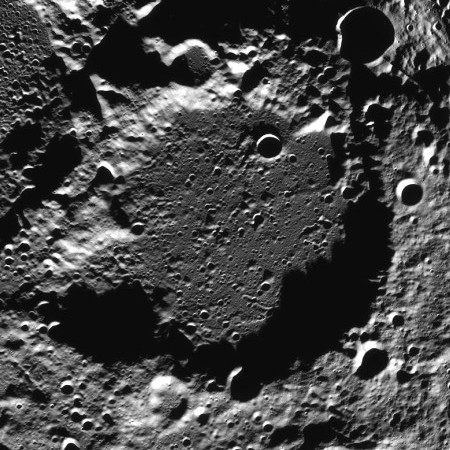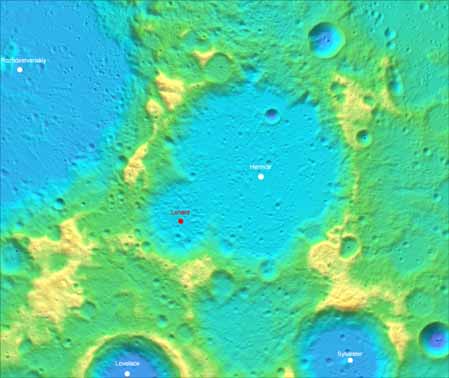Difference between revisions of "Lenard"
| Line 9: | Line 9: | ||
[[Image:Hermite.jpg|Hermite.jpg]]<br /> | [[Image:Hermite.jpg|Hermite.jpg]]<br /> | ||
| | | | ||
| − | [http://the-moon.us/wiki/file/detail/lenard.jpg [[Image: | + | [http://the-moon.us/wiki/file/detail/lenard.jpg [[Image:Lenard-small.jpg|lenard-small.jpg]]]<br /> |
|} | |} | ||
'''Left:''' ''[http://wms.lroc.asu.edu/ LROC]''<br /> '''Right:''' ''[http://wms.lroc.asu.edu/ LROC]'' topographic (false colour).<br /> <br /> | '''Left:''' ''[http://wms.lroc.asu.edu/ LROC]''<br /> '''Right:''' ''[http://wms.lroc.asu.edu/ LROC]'' topographic (false colour).<br /> <br /> | ||
Latest revision as of 02:01, 16 April 2018
Contents
Lenard
| Lat: 85.19°N, Long: 109.69°W, Diameter: 47.65 km, Depth: , farside | |
Left: LROC
Right: LROC topographic (false colour).
Images
LPOD Photo Gallery Lunar Orbiter Images
Maps
(LAC zone 1B4) USGS Digital Atlas PDF
Description
Lenard is a 48-km diameter half-crater near the north pole, straddling the far rim of Hermite. Although it is labeled on Jennifer Blue's new Lunar Orbiter-based IAU nomenclature map of LAC zone 1, its form is much clearer in the Clementine mosaic. It is slightly beyond the mean limb, but should be visible with a favorable libration (whenever the far rim of Hermite is visible). - Jim Mosher
Wikipedia
Additional Information
- IAU page: Lenard
Nomenclature
- Named for Philipp Lenard (June 7, 1862 – May 20, 1947), a Hungarian-German physicist and the winner of the Nobel Prize for Physics in 1905 for his research on cathode rays and the discovery of many of their properties.
LPOD Articles
Bibliography
Two New Crater Names Approved for Earth's Moon
Named Features -- Prev: Lemaître -- Next: Lacus Lenitatis

